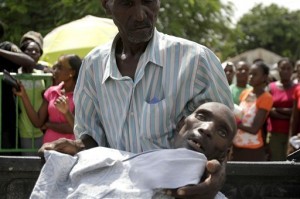 On top of the utter destruction wrought upon the island nation of Haiti by this year’s earthquake, a cruel new misfortune is adding to the misery. Hundreds of thousands of displaced Haitians, people whose homes were destroyed in quake, are living in squalid conditions in temporary tent camps. Without adequate access to clean water or sufficient medical supplies, an epidemic of Cholera has broken out. BoingBoing blogger, Maggie Baker explains what Cholera is and does:
On top of the utter destruction wrought upon the island nation of Haiti by this year’s earthquake, a cruel new misfortune is adding to the misery. Hundreds of thousands of displaced Haitians, people whose homes were destroyed in quake, are living in squalid conditions in temporary tent camps. Without adequate access to clean water or sufficient medical supplies, an epidemic of Cholera has broken out. BoingBoing blogger, Maggie Baker explains what Cholera is and does:
“The bug behind this devastation—the bacterium Vibrio cholerae—is a fascinating and frustrating creature. Fascinating, because of its role in the development of epidemiology and what we’re still learning from it. Frustrating, because it ought to be relatively simple to treat and prevent infection. We know what to do to help a cholera victim survive. All it takes is access to clean water and the most basic medical supplies. The trouble here isn’t science, it’s poverty. Cholera is, essentially, the worst food poisoning you can possibly imagine. In fact, it’s related to Vibrio vulnificus, a bacteria that tends to infect people via undercooked seafood. After you ingest the cholera bacteria, it’ll hang out in your gut for a few days before symptoms kick in. Once they do, though, cholera can kill you within hours. How? I’ll be blunt: Massive, constant diarrhea that drains the body of fluids and electrolytes and leaves victims looking like glassy-eyed, hollow-cheeked corpses before they actually are.”The problem isn’t that medical science cannot beat cholera. In fact all that’s needed to beat cholera is clean water and antibiotics. The problem is poverty – there simply isn’t enough money to ensure clean drinking water and access to simple medical treatment for the Haitian population. Over the jump is a list of places where you can contribute (even the smallest donation is HUGELY valuable) to saving the lives of people who simply shouldn’t have to die. How You Can Help: • Donate to Doctors Without Borders and help get Oral Rehydration Therapy to people who need it. • Donate to World Vision, which does both medical work, and helps bring clean, safe drinking water to communities around the world. • Donate to Water.Org, a charity devoted to water infrastructure projects. Some Other, Related Links: • Fault activity indicates that Haiti is at risk of more, and possibly larger, earthquakes • Fascinating piece explaining how cholera can hide, dormant in a population for years, waiting for a sanitation crisis to attack • Cholera at The Bacteria Museum • The Climate Connection: How warming oceans can influence the spread of cholera • Interesting information on what the toxin produced by cholera bacteria does in the human body and why it causes diarrhea

Its highly unfortunate that this should happen right after a huge calamity. Mostly it falls to the authorities in the area to ensure clean drinking water and supplies but they are not always ready to play their part.
Well I can’t really say that it’s unfair to what is happening to the people of Haiti because Mother Nature is Mother Nature. What is unfair is that the authorities were not prepared for such a devastation and because of this, everyone is now suffering from poverty, which is causing the people to die from Cholera. People should not have to go through what the people in Haiti are going through. Clean water and proper medical supplies should be available to them after such a terrible misfortune.